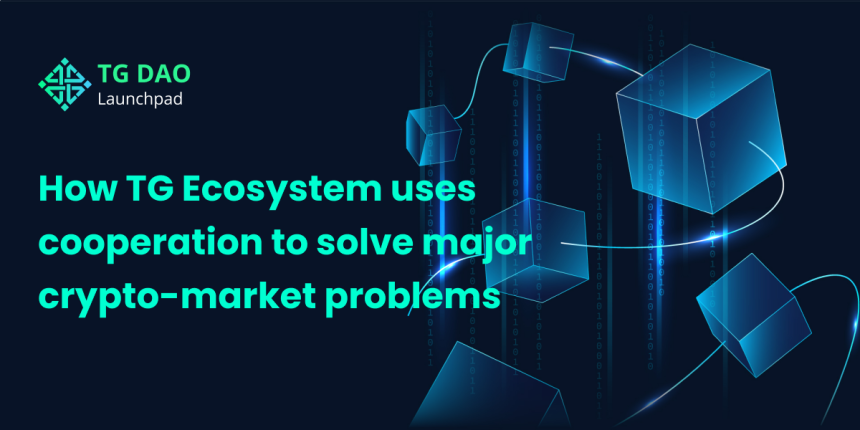Reason to trust

How Our News is Made
Strict editorial policy that focuses on accuracy, relevance, and impartiality
Ad discliamer
Morbi pretium leo et nisl aliquam mollis. Quisque arcu lorem, ultricies quis pellentesque nec, ullamcorper eu odio.
Several models for the development of nations for the next three to five years were presented by the World Economic Forum, where cooperation was emphasized as the foundation for successful and speedy economic and social recovery. Speaking at the WEF, Børge Brende, a Norwegian politician and member of the Conservative Party, said that “the direction in which we need to head is towards greater dialogue, coordination and collective action”. Even today in the world of global business, we’re seeing hundreds of examples of cooperation gone right, such as the UN Global Compact, C40 Cities, Sustainable Trade Initiative (IDH), World Resources Institute, and many others. How are things in the crypto-world?
The problems that cooperation can solve
Cooperation has been popular around the world for many centuries as a form of getting people to work together to achieve certain goals. Nowadays, cooperative societies are designed to solve modern economic problems, namely:
- eliminating intermediaries, thereby lowering the cost of goods and services;
- speeding up the process of producing goods or certain commodities;
- exchanging experience and information in order to make adequate decisions in politics, education, healthcare, and any other economic sectors;
- accumulating resources (money, time, labor) for effectively implementing projects and achieving goals.
Only up until a few years ago, cooperation was predominantly characteristic of industrial and manufacturing enterprises and companies as well as businesses from the non-financial sector. Today, however, we’re seeing more and more examples of cooperation in online environments and among IT projects. Here are just a few of them.
Blockchain Investors Consortium. The Blockchain Investors Consortium has more than 120 members with more than $6 billion in digital assets under management in the group. The funds raised are used to support global projects aimed at the development and popularization of blockchain technology.
IBM Food Trust. This is an association of several blockchain technology companies at once. The IBM Food Trust consortium includes producers of agricultural products, carriers, as well as consumers such as Walmart and Nestle. Furthermore, businesses can track food products from their suppliers to consumers using their platform.
Today, cooperation can not only accelerate the launch of crypto and blockchain startups but also significantly influence the popularization of blockchain technology in the world.
The true power lies in a number
“Let’s remember what happened on the stock market with Gamestop. Hundreds of thousands of retail investors rushed to buy up the securities of a little-known company, succumbing to the influence of FOMO, which was skillfully created by crowd manipulators. Crowds, after all, are easy to manipulate. As a result, investors lost money after all the excitement had died down. A well-thought-out participant self-organization system turns a crowd into a group, and a decision-making system makes it possible to solve this issue in a centralized way,” says Eugene Melnik, the CEO of TG Ecosystem.
The self-organization of groups and, later on, the cooperation between them will be the solution to spontaneous investments lacking a clear strategy for recovering funds. The TG DAO 3.0 Launchpad, part of the TG Ecosystem, presented an effective solution to reduce the risks associated with investing in cryptocurrency, based on self-organization and cooperation.
“We analyzed the main reasons for the failure of the ICO boom in 2018 and developed our own solution for the startup launch market. It lies in the cooperation of experts, users, and the projects themselves. We achieve our goals much faster when we act together rather than separately,” said Eugene Melnik.
The TG DAO 3.0 Launchpad includes several instruments for effective crowdfunding. These include an accelerator and a platform for IDO, as well as other services that will be launched in 2022. The Launchpad team is also ready to collaborate with not only blockchain startups, but also with venture capital projects that offer innovative solutions for various areas of business.
“Even today, we’re receiving a large number of applications to participate in the accelerator program and conduct IDO. Four projects have been approved by our expert council and will soon be eligible for discussion by community launchpad members. By the end of the year, we plan to review another ten projects and choose the most deserving of them,” Eugene Melnik comments.
Cooperation is crucial when choosing startups to invest in, so the Launchpad team has arranged a voting system where users will decide which startups are allowed to conduct a token sale. This way, investors avoid the problem of recklessly investing their money into sketchy projects.
Cooperation introduces several advantages that can be successfully used in projects.
“First of all, it’s the ability to bring groups of people together and create the appropriate targeted programs for the purpose of investing or conducting joint activities. Secondly, the simplicity of participating within a cooperative, since a participant only needs to submit an application and pay the minimum entrance and share fees. Funds or other proprietary contributions to startups are allocated as early as when the cooperators create the program in question.
Thirdly, the cooperative has the possibility to distribute its income among project participants in proportion to their participation in the cooperative’s business activities. In this case, it is the cooperative members themselves who decide on how the income is to be distributed,” says Natalia Khitruk, lawyer at TG Ecosystem.
In the very near future, TG DAO 3.0 will conduct a Funding Round and a Public Sale of TGDAO tokens. More information about the project can be found on the website.





















